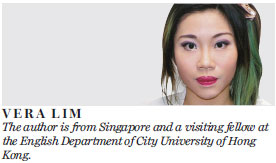Lee Kuan Yew will be greatly missed by many
Updated: 2015-03-24 07:57
By Vera Lim(HK Edition)
|
|||||||||
Monday, March 23, 2015, Lee Kuan Yew, founding father of modern Singapore, passed away. As a Singaporean - and one living overseas - I feel shaken, and perhaps even a little lost. How does one mourn, when so far from where it happened, the newspapers flush with eulogies, the flags at half-mast, and so on? Of course I never met him in person, but like any Singaporean, he has been a huge part of my life. He was the prime minister I watched on television as a child, the leading personality in modern Singapore history books, and the one to look out for every National Day Parade, as my family and I watched him grow older and more frail each year.
I realize that I have become more defensive of Singapore and its policies since leaving, which is somewhat ironic, considering how, along with many other Arts and Humanities graduates, I used to be rather left-wing. Perhaps distance adds clarity, and I was unable to see the wood for the trees back home. I am now fortunate enough to be living in a city many Singaporeans admire for its vibrant dynamism, unaware of the similar, yet different, issues Hong Kong faces, and how the admiration actually goes both ways.
The late Minister Mentor Lee has had his critics, and is often the target for jibes about Singapore's perceived "democracy" and supposed "Nanny State" qualities, yet the city-state's success has its roots in policies he implemented decades before. Although the desirability and side-effects of his policies may be moot, they remain the building blocks of modern Singapore.
Housing under the Housing and Development Board (HDB) of Singapore may be government housing, with functional designs and communal facilities. But with over 80 percent of Singapore's population living in such HDB apartments, it looks nothing like any other kind of government housing in the world - these apartment blocks are maintained, and even upgraded with new amenities to reflect the changing times. For example, in a mature estate with an aging population, modifications such as lifts that stop at every floor and handrails for staircases are implemented. Now, when I reflect on home, there are so many things I didn't appreciate until I left, above all the ease with which I can apply for and obtain a flat in Singapore, in contrast to years of waiting for most Hong Kong people before their applications are fruitful. Satisfying this fundamental human longing is the basis of Lee's belief that in order to foster a sense of ownership of Singapore within its ranks, the most effective way would be through ensuring everyone would have the opportunity to own their home - something which I took for granted back home, until I came to Hong Kong and heard about the plight of young adults here.
Another aspect of Singapore I never truly appreciated until much later was the education system: How all lessons are conducted in English, again, in an attempt to foster a sense of belonging in a new country. The virtue of relegating one's mother tongue to the sidelines is debatable, but the language policy coupled with secular schools, have taught me the necessity of color blindness through giving me the opportunity to meet people from beyond my comfort zone. As a student, I vehemently disliked the policy of bilingualism: English and Mandarin were alien to me, and my parents were not much help, being Cantonese speakers. I do regret being unable to speak Cantonese, but as the Chinese population of Singapore consists of many disparate dialect groups, I do understand why Mandarin was selected as the language of instruction for Chinese lessons. Conducting Chinese lessons in Mandarin is also testament to the late Lee's foresight, for this bilingual policy allowed a generation of fluent Mandarin speakers who were ready to seize the economic opportunities that arose when China opened up.
This year was to have been a commemoration of the 50th anniversary of the founding of modern Singapore, but with the passing of Lee, a solemn air is settling over the festivities. His passing during this festive year marks the end of an era, as the city-state has depended on Lee for the past 50 years, with the creation of a new senior government post for Lee every time a new prime minister took office. Perhaps this is a good time for the Singapore government to realize that they have, for too long, been resting on the laurels of the past successes, accumulated by Lee and the old guard. The challenge that awaits them is foremost to uphold the government's immaculate and efficient reputation, to ensure it is equal to the task of maintaining the city-state's competitive edge in a changing world, while upholding the high standards of living to which its citizens are now accustomed.
Rest in peace, Lee Kuan Yew, your presence this National Day, and those that follow, will be missed.

(HK Edition 03/24/2015 page12)